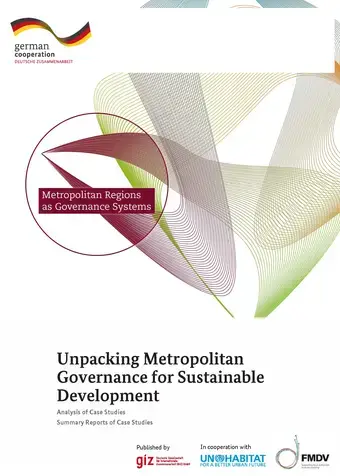 This metropolitan governance case study is part of a joint effort of GIZ and UN-Habitat and is complementing the global study “Unpacking Metropolitan Governance for Sustainable Development” (GIZ/ UN-Habitat, 2015).
This metropolitan governance case study is part of a joint effort of GIZ and UN-Habitat and is complementing the global study “Unpacking Metropolitan Governance for Sustainable Development” (GIZ/ UN-Habitat, 2015).
 This metropolitan governance case study is part of a joint effort of GIZ and UN-Habitat and is complementing the global study “Unpacking Metropolitan Governance for Sustainable Development” (GIZ/ UN-Habitat, 2015).
This metropolitan governance case study is part of a joint effort of GIZ and UN-Habitat and is complementing the global study “Unpacking Metropolitan Governance for Sustainable Development” (GIZ/ UN-Habitat, 2015).

This case study analysis forms part of the publication series “Unpacking metropolitan governance” that documents experiences and gives hands-on approaches for stakeholders in the field of sustainable development of metropolitan regions. The analysis and the summary reports of the case studies of Metropolitan Bandung (Indonesia), Guadalajara Metropolitan Area (Mexico) and e-Thekwini (Durban, South Africa) are following the joint publication of the discussion paper “Unpacking Metropolitan Governance for Sustainable Development”, UN-Habitat, GIZ and FMDV encourage a critical and intensive discussion among policy makers and practitioners about the findings and recommendations offered by the discussion paper, case study reports, and analyses. The publication series shall serve as a reference point for the ongoing international discussion on transforming urbanization, implementing the Sustainable Development Goals at the local and metropolitan level and thereby contribute to the Habitat III debate.
In addition, GIZ and UN-Habitat have developed a Metropolitan Capacity Assessment Methodology as a modular toolbox to assess existing capacity in a metropolitan setting, future needs, and identify options for change.
The report aims to strengthen Habitat Agenda Partners and other non-state actors in Sub-Saharan Africa in their policy dialogues and capacity-building processes. The report is designed to inform and enrich national level engagements across sub-Saharan Africa on advancing the urban agenda.
Chris Jefferies, Urban Drainage System Expert, in this lecture addresses the need to reduce the impact of city development of flooding on residents and in other places, and the worsening of the water quality in streams, rivers and lakes caused by the expansion of cities.
This joint publication “Unpacking Metropolitan Governance for Sustainable Development” is the product of a close cooperation between GIZ and UN-Habitat. Against the background of rapid urbanization, new forms of power relations between the different levels of government emerge and stronger coordination and cooperation is required.
GIZ and UN-Habitat are both convinced that effective metropolitan governance is crucial for transformative development, considering social, political, economic and environmental impacts. While the subsidiarity principle is still valid and valuable, some decisions are most effectively implemented at a metropolitan level that follows the functional area. Climate change, natural disasters or economic development do not stop at administrative boundaries, hence joint action needs to be taken.
Infrastructure needs can be better solved through joint forces and coordination between administrations and different stakeholders. This study shall give insights into ways metropolitan regions are governed and how it relates with the good urban governance principles.
In addition, GIZ and UN-Habitat have developed a Metropolitan Capacity Assessment Methodology as a modular toolbox to assess existing capacity in a metropolitan setting, future needs, and identify options for change.
Cairo, 15 May 2015 –The League of Arab States Ministerial Council for Housing and Construction Executive Bureau meeting has been held in the Egyptian capital.
 As the Millennium Development Goals (MDGs) expire in 2015, an international process is underway to define the Post-2015 Development Agenda. This process involves a wide range of stakeholders, and has spanned several years.
As the Millennium Development Goals (MDGs) expire in 2015, an international process is underway to define the Post-2015 Development Agenda. This process involves a wide range of stakeholders, and has spanned several years.
This publication is part of the activities of the Global Network for Sustainable Housing (GNSH) managed by the UN-Habitat Housing Unit. The handbook presents practical solutions to outgrow accessibility barriers for persons with disabilities and older persons in the contexts of slum upgrading, reconstruction, large-scale affordable and social housing programmes.
This handbook aims to bridge the existing gap between the needs and rights of persons with disabilities and older persons with slum upgrading, reconstruction, large-scale affordable and social housing programmes. Through the provision of concepts, major policy approaches, practical information and technical tools, the handbook intends to build capacity regarding designing and implementing accessibility in identified contexts. Likewise, it brings into light the implication and the global importance of developing accessibility of sustainable human settlements.
Water operators worldwide are in need of assistance and capacity building support to sharpen service delivery. Experienced water operators, professional water associations, national water ministries, development agencies and international finance institutions have a privileged position in assisting them. Partnerships between operators have emerged as a feasible way to improve their own efficiency and effectiveness.
This publication is aimed at supporting the country Governments of the Asian region in achieving the MDG relating to Water and Sanitation by sharing solutions which can be easily replicated, scaled up and sustainable besides being cost effective and innovative.
The experiences presented in the Publication provide a road map and serves as a guide book to all stakeholders not only in the Asian region but also to the other countries, who involved in improving the quality of life by promoting drinking water supply and safe sanitation.